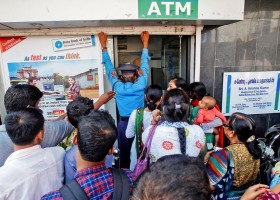 In November, the Indian government announced, with little warning, that the country would be withdrawing the legal status of its 500 and 1000 rupee notes, over 80% of the current currency in circulation. The effort to curb corruption has left many Indians in a state of chaos, with long longs forming as citizens wait to exchange their old notes for new ones. Below, are a series of articles written by SAI and Harvard affiliates.
In November, the Indian government announced, with little warning, that the country would be withdrawing the legal status of its 500 and 1000 rupee notes, over 80% of the current currency in circulation. The effort to curb corruption has left many Indians in a state of chaos, with long longs forming as citizens wait to exchange their old notes for new ones. Below, are a series of articles written by SAI and Harvard affiliates.
Please note: The views expressed here belong to the author, and do not necessarily reflect the views of the South Asia Institute.
India Wants a Cashless Society. But There’s a High Cost. – Slate
“There are long, debilitating queues for banks and ATMs. Wages and bills have not been paid. Rural Indians often have to travel a long way to reach a bank, and an estimated 300 million people don’t have the official ID that’s required to process a cash exchange. In some places, a barter economy has even re-emerged. That’s a marker of ingenuity, perhaps, but hardly the modernity that India is striving for. India’s most decorated economist, the Nobel Laureate and Harvard Professor Amartya Sen, says: ‘The move declares all Indians — indeed all holders of Indian currency — as possibly crooks, unless they can establish they are not.’ Meanwhile, the people with the most black money—the people the policy was intended to target—are unlikely to have wads of cash under their mattresses. Their money will be safe in foreign bank accounts and property holdings.”
–Hasit Shah, SAI Research Affiliate
Is the Current Demonetisation Legal? – Centre for Policy Research
“The failure to issue an ordinance to provide the legal basis for the demonetisation notification this time renders the demonetisation exercise illegal. Even if the act of demonetisation is severed from the restrictions placed on people’s access to their cash and bank accounts, the latter stipulations are both illegal and unconstitutional on several counts.”
–Namita Wahi, Former SAI Graduate Student Associate, S.J.D., Harvard Law School
A Nation Demonetized: Addressing India’s Parallel Economy – Kennedy School Review
“After visiting India in the midst of this new policy and speaking with a number of individuals about the short- and long-run effects, I conclude that this policy comes at great cost to the government and the people it should be serving. The government should have brainstormed alternative ways to target the problem of corruption and black money. Now that the policy has been put in place, however, the government can still serve its people by implementing a number of follow-up reforms that can enhance the goal of broader and more inclusive growth.”
–Kavi Patel, Harvard College ’17
India’s Currency Exchange and The Curse of Cash, – Princeton University Press blog
“Despite apparent huge holes in the planning (for example, the new notes India is printing are a different size and do not fit the ATM machines), many economists feel it could still have large positive effects in the long-run, shaking up the corruption, tax evasion, and crime that has long crippled the country. But the long-run gains depend on implementation, and it could take years to know how history will view this unprecedented move.”
–Kenneth S. Rogoff, Thomas D. Cabot Professor of Public Policy, Harvard University
Interview: Demonetisation move declares all Indians as possible crooks, unless they can establish otherwise, says Amartya Sen, – Indian Express
“Telling the public suddenly that the promissory notes you have, do not promise anything with certainty, is a more complex manifestation of authoritarianism, allegedly justified — or so the government claims — because some of these notes, held by some crooked people, involve black money. At one stroke the move declares all Indians — indeed all holders of Indian currency — as possibly crooks, unless they can establish they are not.”
–Amartya Sen, Thomas W. Lamont University Professor, and Professor of Economics and Philosophy, at Harvard University
